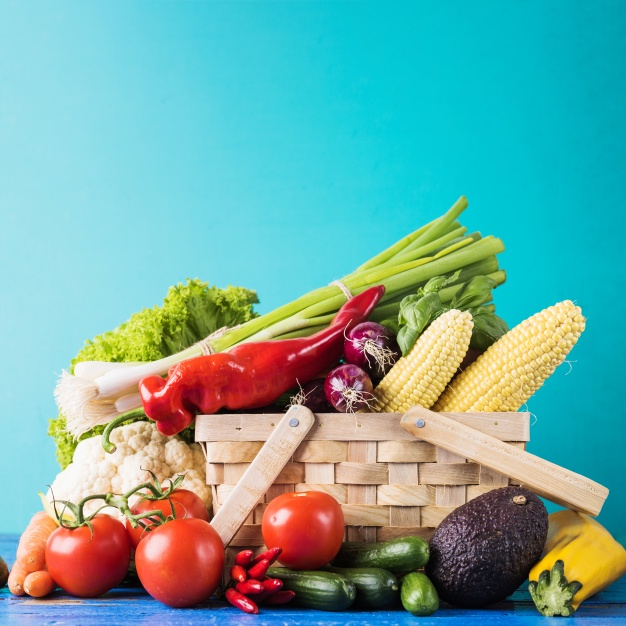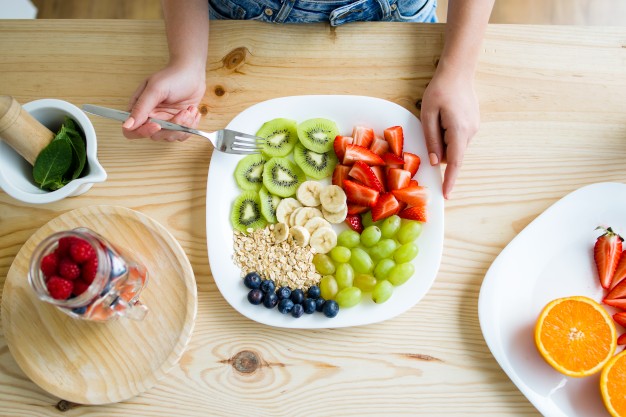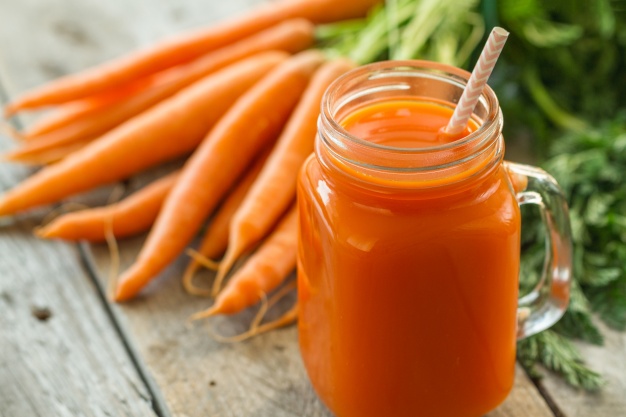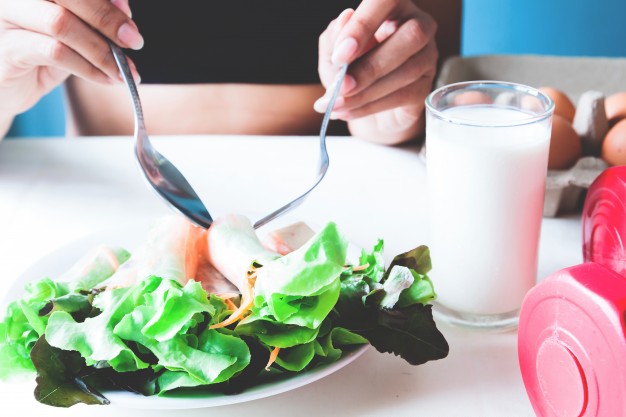Dear Pooja,
I am in college and I have been working out in the gym from the past 5 months. I first started out by doing cardio and rigorous weight training in the gym during my break, then when college started, I started running for 45-50 min in the park. I would sometimes do 50 min cardio in the gym (25 min cross trainer and 25 min running on the treadmill instead for running out in the park). My diet is extremely healthy, I make it a point to eat healthy home cooked meal. I sometimes each red rice or jowar roti or normal roti during meals. I each 3 fruits during the day and plenty of water. As I belong to a Punjabi family, we eat non-vegetarian dishes cooked in minimum oil 5 times in a week. But my mom compensates that with giving us lots of vegetables to each. I eat an egg every day. I don’t indulge in deserts and i avoid fried foods. Despite my efforts, I’ve gained 6 kgs in the past 4 months. Could you help me with the same.
To start with I must say I am happy to hear that as a teenager (assuming that since you said college) you are trying to lose with food and not without it – as most would just think of food as calories and thus the main culprit to weight gain. Food is your sole nurturer and growth provider – never ever shun away from it.
Now to comment on your diet- at the first glance absolutely nothing looks wrong in your eating pattern that would cause this weight to go up – you are doing a good balance of input (food) and output (cardio). It seems to be a good balance of carbs (brown rice, jowar roti), proteins (non veg + egg), vitamins and minerals (3 fruits+ vegetables).
However, Sanjana please note that your input (however healthy) has to within the specific need of your body. When I say ‘need’ I mean that every body has its BMR (basal metabolic rate), which is the minimum calories it needs for its own basic functioning. Weight gain is a consequence when the input is more than the output. To perfectly know your body’s need you could ask for professional advise or even calculate your BMR using online tools that only need your height, weight, age and gender to calculate the same for you. In my book – Eat.Delete I have taught you how to do this and then also pick up a diet as your BMR that will give you the total amount of food you need to eat in a day.
Sadly I have no simply answer to give you for your weight gain – but remember our body is a magnificent machine that works relentlessly day and night – its needs thus are special and require a little fine tuning when we are talking about losing or gaining weight. Learn this delicate balance once and your body will respond to it marvelously and continuously. Whatever you do never give up your faith in food – that then is my mission accomplished!
Dear Pooja,
I am 21. Becoming overweight is my problem. I have put on about 15 kilos of weight in the last three years. I tried many ways – walking, swimming, dieting – but gained weight. I did not get benefits from any of that. Maybe because I expect quick results that I get disappointed. How much time is needed to lose weight? Which is the best healthy and economic way to lose weight?
Just like any vocation or course that you would be currently studying Jwala, the knowledge and the experience will stay with you for the rest of your life not just until you are in university studying it. Similarly food, exercise and body weight all part of a continuous circle. Maintaining body weight is not a one-time effort that you try, succeed or fail and then drop the actions that took you there. You are what you eat – your weight is nothing but a balance of how much you eat and how much you burn (exercise). Learning this art of balance is a one-time deep, rooted-effort that each and every one of us must make and then maintaining your body weight will be easy as the that friend or colleague that you always envy has got it lucky. Walking, swimming and eating – all are calorie burning processes – then why would they not let you lose weight? But while burning the calories through exercise if you are eating just as much or maybe a little more then you cannot see the scale go down. Calculate your need (BMR – through several online tools) and then break up your day’s meals to fit in that number. Now increase the burn by doing an intensity and duration controlled cardio daily – do this consistently for a few weeks (there is no short cut to losing weight) there is no way but to lose that fat that is bothering you. Once you succeed in this effort please do not let go of this awareness and this basic balance of input and output and you shall never have to fight the battle of bulge again.
Dear Pooja,
My father, 72, had an open heart surgery a few weeks ago and is better now. He did not have a heart attack, and he does not have diabetes nor high BP. What are the kinds of foods he can have now to gain back his strength? He is slim and had been otherwise fit always and is a vegetarian.Your father can most easily be the best example to what I say over and over again ‘You are what you eat’ being a wise eater thus the absence of any excess weight baggage and like you said fit always’ and therefore is metabolic disease free even now. The reason for an open-heart surgery could very well be age related plague deposition as the most noticeable characteristic of vascular ageing is the change in the mechanical and structural properties of the vascular wall. Now to help him regain his strength first focus should be on better quality proteins – being vegetarian please ensure you are giving him one-two servings of dal/pulses/sprouts daily – low fat milk and its products and if possible introduce some quinoa and soyabean weekly. Vitamins are another point to emphasis thus ensuring no micro nutrient deficiency leading to delayed healing. Two-three servings of vegetables plus an additional raw veggie juice daily (minimum three colours of vegs) along with two-three servings of fruit daily should do the trick. Ample hydration, adequate sleep and slow walks for about 15-20 minutes a day should help in better recoup and recovery. Check with your doctor or nutritionist for basic multi vitamins and some B12 as well as omega 3-6-9 supplements since he is vegetarian. Always keep the faith in the magic and the powers of healthy frequent eating and may he have a long healthy life ahead.
Dear Pooja,
My son is 14 yrs, height 5’3″ but weight is 84 kg. He started a crash diet . I want a healthy diet which can help him reduce weight but with no loss of essential elements .
His daily routine is wake up at 6:30 am and go to school at 7:30am . In school two break at 9:30am and 12:00pm respectively. After that he comes back at 3:15 and goes to the gym at 4:30 pm for a hour. Then comes home to eat some snacks. At night he eat dinner at 8:30 pm. We are pure vegetarian. Please help meIn today’s children awareness about the weight and their body size is setting in earlier then before and especially once they in their teens they are conscious of the way they look particularly in comparison to peers. Teaching them the correct relationship to food at this point (and many a times even much earlier) is most essential else they fall in to the trap of equating food to calories and thus fearing it always. Giving up food or starving then seems to be there only route to losing the excess weight they are carrying. Teaching them the importance of food through its food group system and the significance and function of each is the prime crux. Carbohydrates (which most fear – leave alone just kids) are the prime source of fuel – daily activities of running, studying, playing even just sitting requires energy that comes from carbs and this vital food group is usually the first to be omitted. Lack of adequate carbs leads to growth retardation, poor immunity, low stamina, crankiness and mood swings among a hundred other side effects. Importance of proteins for growth, height increment, wear-n-tear and repair is most crucial. I cant even stress enough on the daily inclusion of fruits and vegetables as this is what will shape their skin, nail, hair, bowel movements and so many essential internal body functions all of which depend on the vital vitamins and minerals nutrients they provide. A balance of these essentials is fundamental to live a life of quality, growth and prevention of disease. Sadly I am unable to provide a diet particularly for your son through this column but I’d strongly recommended visiting a professional that will advise and guide him in the right direction now itself. All the best!
Dear Pooja,
My 17-year-old daughter suffers tremendously during her menstrual cycle every month. During those days, she barely eats and says most foods make her feel nauseous. Are there foods that will help ease her symptoms? Should she avoid certain foods? Does staying active help? Please advise.
Painful periods is a very common problem among teenage girls and women which hinder their normal school related, household or job work. Although some pain during periods is normal, excessive pain is not. The medical term for the same is dysmenorrhea.
Now the diet during these days is the most important and not eating is going the make the symptoms of discomfort worse. A diet rich in carbohydrates (roti, rice, bread, puha, upma and the like) having a good focus of good quality protein (egg whites for non vegetarians and soya, quinoa, pulses for the vegetarians) helps to continue the wear and tear functions of the body smoothly which is high during monthly menstruation due of uterine wall breakdown. So make sure you feed her some of these foods in the any form that she likes – the cuisine, style of cooking and taste can be adjust to suit her taste buds but eating is most essential.
A diet rich in vitamin B6 or pyridoxine helps ease period pain. Include fish, beef, starchy vegetables like potato, banana , rice, fortified cereals in your diet to get good quality B6 or even a supplement (50-100mg) a few days prior to, during and 3-4 days post completion of your periods every month is a good way to alleviate this pain. Among other aids – a warm water bag or heating pad applied to the lower belly area, light circular massage on the abdomen, warm beverages, warm shower or bath and light exercise all help to ease the pain. Good luck!
Dear Pooja,
I am a middle aged woman. I regularly suffer from acidity. Digesting food easily is difficult for me. Even when I fast for the whole day, I suffer from acidity. This is why I have also been unable to gain any weight since a number of years. Although my appetite is normal, the acidity becomes a problem. What should I do?Acidity is an ailment that we all have suffered from at one time or another. Do remember acidity is a sign our body is trying to give us. The most obvious signaling is because of large gaps between meals. Our gastric lining produces the acid as a means to aid digestion – as its enzymes only activate and function in an acidic medium. When the gaps are too long this acid starts corroding it’s own lining causing ulcers. One of the best ways to neutralize the acid produced is to give it the food, this way the lining of the stomach is always protected and belching, heart burn or acidity is kept well at bay. Fasting sadly is not helping this process unless you eat a fruit or some milk every few hours. One of the easiest ways to eliminate acidity is to eat a fruit within the first half to hour of rising – this helps break the long gap between dinner the night previous and breakfast. Avoid starting your day with caffeine – your must have cuppa of tea or hot coffee first thing in the morning only triggers the acid producing cells to work better and faster. Line the tummy with some food first – if not a fruit then a toast or khakra or a biscuit and let the tea follow 20 minutes later. Acidity may be a minor ailment but if left uncorrected can be the cause many bigger problems like frequent sore throat, nagging recurrent cough, migraines, dental cavities just to name the basic few.
Dear Pooja,
I am a 18-year-old girl and my dietician has suggested me that I drink tomato and spinach juice every day. However, I don’t like the taste and find it difficult to drink. Is there an alternative to this?
Your dietitian has only your best interest at heart when she recommends a vegetable juice for you daily. If you inculcate the habit of chugging down one fresh glass of potent natural vitamins, minerals and anti oxidants today at 18 years of age you will never need to pill, dermats and ageing treatments at any age. Nutrition from the plate and not a pill. I’m sure the combination is not locked for you and you can take any vegetables (I’d suggest minimum three) of different colours (for a variety of anti-oxidants) to make you juice daily. The key to its magic is immediately preparation and consumption so that no vitamins are lost and oxidized in translation. Add flavours like celery, ginger, lemon, mint and coriander to enhance the taste. Also I would recommend that a minimum of 50 percent of the roughage be retained in the juice so that your fibre intake of the day also gets done. The vegetable juice daily helps in better bowel movements, clearer skin, stronger hair, longer nails, more energy, better stamina, lesser hairloss, improved immunity, reduced episodes of cold and cough……what more can you ask? So go slurp down a glass of veg juice now! All of you.
Dear Pooja,
With Diwali just over, I know I have sinned with my eating and exercise. How do I make up? How do I pick up all the efforts where I left off?
To err is human, right? Well, to fall off the wagon is expected of many but the intensity and gravity to ‘want’ to get back on is that demarcates achievers from the non-achievers. Clap, roll and drums to those who resisted the temptations the week had to tickle and tempt us with – really will power and motivation is an acquired skill, the more you practice the stronger and more successful you get with it. But the cause to get back on track is also noble and commendable (many lose the way just about here) and good part is that it is not difficult to do the same. The first efforts I’d focus on are to get the total oil/fat intake of the day in control. Be more vigilant in the kitchen if maids are cooking or better still you take the initiative – this is the backbone to controlled calorie intake per day. Ensure an hour (or may 80mins/day) of cardiovascular activity at least 4-5 times a week – regulated output is the best way to burn the ‘cheats’ committed during the festivities. Regulate, control or avoid any more outside food eaten for the coming week or so – do remember however hard you try the oil quota is difficult to control when you dine out. The key to ‘pick the bus’ where you left off is the keen desire and wiliness to forget the errors and start back immediately – the longer you wait to ‘start back’ the more difficult it is – so for all those (and I’m sure the numbers are a vast majority) who slipped – pull up your socks – you erred but now lets make up, be more vigilant, more committed, more dedicated to cause of getting healthier and slimmer cause ‘where there is a will, there is always a way!’
Dear Pooja,
I am suffering from diabetes since the last six years. I have tried various diets but none seem to work for me. Ideally, which vegetables should I eat and avoid?The best most effective way to balance blood sugar levels is to eat every two hours. At the cost of sounding repetitive (over and over again) eating two hourly is the most optimum way to provide fuel to the body. When eating small meals frequently there is never excess rise in the sugar levels that lead to the excess being stored as fat and neither are there lows or drips in the blood sugars levels that lead to binge eating large portions (especially of wrong meals) that soar the sugar to unnecessary levels. I have effectively improved the glycosylated hemoglobin (average sugar control in the body for an average of three months) of so many just by this simple formula of frequent small meals. While trying to control the sugar levels eating two hourly also helps you knock off weight, which in turn again helps in managing the diabetes better. Another ace in the management of diabetes and in general a healthy lifestyle is to clock about three to four hours of cardio a week. All vegetables are good for you Aliyas I wouldn’t worry about vegetables – even a potato upto a 100grams a day is allowed. So start small and simple- break up everything you eat into small eight to ten meals a day and get your diabetes and your health in your hands. Good luck!
January. No month bursts with as much promise as this one. A fresh start to the year, a clean slate. It’s when gym memberships increase, when resolutions to get healthier spike. But come June or July -or even February or March -and your enthusiasm dims… till it’s December again.
AGAIN
Why does this cycle repeat itself? What is it about new year resolutions -especially the ones that seem to be made for fitness -that fail? I think the answer lies in not just understanding your body but also your mind.
UP AGAINST AGE-OLD HABITS
If you have never -or barely -exercised in the previous year, you can’t expect to suddenly hit the gym six times a week, and subsist on kale, lettuce and fresh air when the clocks turn over from December 31 to January 1. Your body doesn’t understand calendars, it understands repetition eat healthy long enough, exercise regularly, and your body slowly begins to form healthy habits and expects, sometimes even craves, a lifestyle that’s leaner and greener.
SEEKING INSTANT GRATIFICATION
Changes that stick are changes that you introduce gently, patiently and systematically. Good habits take time to form. And how much time it takes varies from body to body. Your body and mind will take time to adapt to your new lifestyle. At times, this may frustrate you because your unfit habits try to latch on for as long as possible.
Pick yourself up everytime you slip. Make a fresh start. You may fail a 100 times, but you need to succeed just once to get yourself going. Setting new habits is one of the hardest things to do. Also, the time frame to reach a healthy goal varies from person to person. Some bodies respond quickly, some take time. But everyone always gets there.
YOU HAVEN’T PLANNED WELL
Fitness and weight loss require planning, thought and organisation. Have you selected the right meal plan that fits your existing eating habits? Do you have access to healthy ingredients? Are you prepared with healthy snacks in your bag in case you feel hungry during the day? If you are a working professional or can’t cook, do you have the support system or arrangement to get healthy food?
Have you chosen a fitness programme group that’s right for you (not too advanced or strenous)? Is the gym too far away from your home or office?
You need to make access to fitness convenient for you. You don’t fit your life to fitness, you have to fit fitness into your life. It’s called the battle of the bulge because it takes time and hard work until fitness becomes a permanent part of your life. Remember that it is not you against someone else it’s you against you. If you set your own bar and compete with yourself, you will always win because it’s your race. On your terms.









